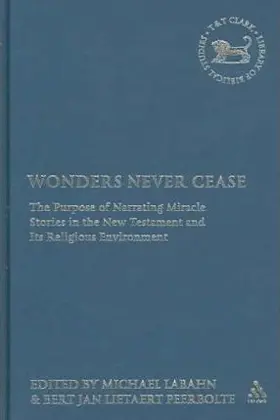

Wonders Never Cease: The Purpose of Narrating Miracle Stories in the New Testament and Its Religious Environment
in Library of New Testament Studies
Pages
312
Publisher
T&T Clark
Published
2/23/2006
ISBN-13
9780567080776
Early Christians articulated their christological claims by narrating miracles of Jesus. The Gospels depict Jesus as a healer and an exorcist who preaches the nearness of the kingdom of God. The miracles he reportedly performed are often regarded as eschatological signs of the nearness of the kingdom. Thus Jesus the miracle worker is understood from the perspective of Jesus the preacher of the kingdom. In a history-of-religions approach, however, the narratives on Jesus' miracles do not stand apart, but should be interpreted as part of the religious vocabulary of antiquity. They are closely related to other miracle stories narrated in the world within which the early Christian movement originated.
Given the need to position miracle stories on Jesus within their religious and historical contexts, the present volume discusses evidence on miracles and the narrating of miracle stories from both the New Testament itself and its religious environment. It asks for the literary and religious dynamics of miracle stories and studies different contexts out of which miracle stories originated. The various contributions intend to demonstrate for what reason miracle stories were told in different religious, political and historical circumstances. All authors are experts in their field and position the narrating of miracle stories within a specific literary and religio-historical context.
Given the need to position miracle stories on Jesus within their religious and historical contexts, the present volume discusses evidence on miracles and the narrating of miracle stories from both the New Testament itself and its religious environment. It asks for the literary and religious dynamics of miracle stories and studies different contexts out of which miracle stories originated. The various contributions intend to demonstrate for what reason miracle stories were told in different religious, political and historical circumstances. All authors are experts in their field and position the narrating of miracle stories within a specific literary and religio-historical context.
- Table of contents
- Preface
- Abbreviations
- List of Contributors
- Part I
- A Miraculous Birth of Isaac in the Book of Jubilees? - Jacques van Ruiten
- Asklepios' Healings Made Known - Jan den Boeft
- Miracle Stories and Their Narrative Intent in the Context of the Ruler Cult of Classical Antiquity - Ulrike Riemer
- Miracle-traditions in Early Rabbinic Literature: Some Questions on their Pragmatics - Michael Becker
- The Function of the Miracle-Stories in Philostratus's Vita Apollonii Tyanensis - Erkki Koskenniemi
- Part II
- Markan Miracle Stories in Historical Jesus Research, Redaction Criticism and Narrative Analysis - Geert Van Oyen
- 'Many-coloured Illnesses ...' (Mk 1.34): On the Significance of Illnesses in New Testament Therapy Narratives - Reinhard von Bendemann
- Fishing for Meaning: The Miraculous Catch of Fish in John 21 - Michael Labahn
- Being There: The Function of the Supernatural in Acts 1-12 - Matti Myllykoski
- Paul the Miracle Worker: Development and Background of Pauline Miracle Stories - Bert Jan Lietaert Peerbolte
- Eschatological Signs and their Function in Revelation of John - Beate Kowalski
- Part III
- Cannibals, Myrmidonians, Sinopeans or Jews? The Five Versions of The Acts Andrew and Matthias and their Source(s) - Lautaro Roig Lanzillotta
- Images of Hope: Towards an Understanding of New Testament Miracle Stories - Bernd Kollmann
- Index of References
- Index of Authors
Inner Books
This physical volume has several internal sections, each of which has been reviewed independently
- A Miraculous Birth of Isaac in the Book of Jubilees? by Jacques van Ruiten
- Asklepios' Healings Made Known by Jan den Boeft
- Miracle Stories and Their Narrative Intent in the Context of the Ruler Cult of Classical Antiquity by Ulrike Riemer
- Miracle-traditions in Early Rabbinic Literature: Some Questions on their Pragmatics by Michael Becker
- The Function of the Miracle-Stories in Philostratus's Vita Apollonii Tyanensis by Erkki Koskenniemi
- Markan Miracle Stories in Historical Jesus Research, Redaction Criticism and Narrative Analysis by Geert Van Oyen
- 'Many-coloured Illnesses ...' (Mk 1.34): On the Significance of Illnesses in New Testament Therapy Narratives by Reinhard von Bendemann
- Fishing for Meaning: The Miraculous Catch of Fish in John 21 by Michael Labahn
- Being There: The Function of the Supernatural in Acts 1-12 by Matti Myllykoski
- Paul the Miracle Worker: Development and Background of Pauline Miracle Stories by Bert Jan Lietaert Peerbolte
- Eschatological Signs and their Function in Revelation of John by Beate Kowalski
- Cannibals, Myrmidonians, Sinopeans or Jews? The Five Versions of The Acts Andrew and Matthias and their Source(s) by Lautaro Roig Lanzillotta
- Images of Hope: Towards an Understanding of New Testament Miracle Stories by Bernd Kollmann